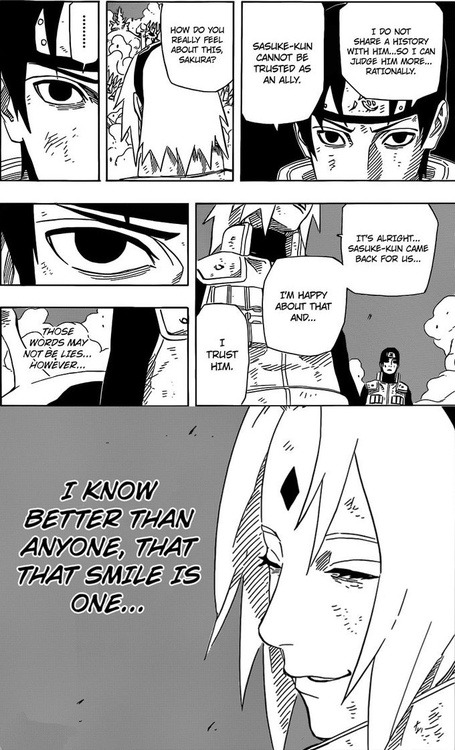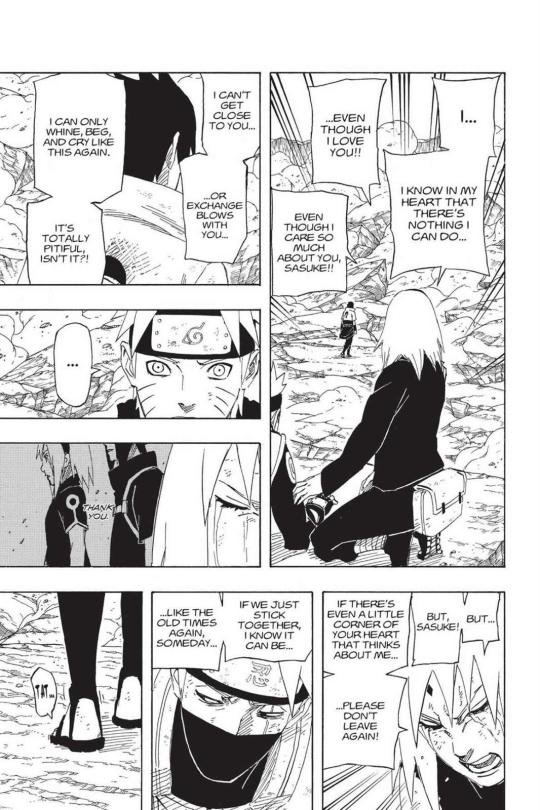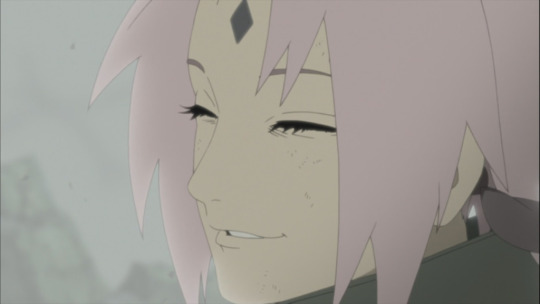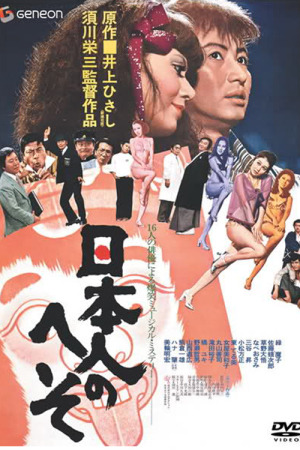Note
trying to come up with SaiSasuke headcanons. 🤔 theyre in the same line of work.. (investigation/intel gathering) with Sai based in Konoha.. and Sasuke outside Konoha. and sometime they crossedpath (Mujina bandits arc-Kara investigation). i feel like theyd work well together in terms of chemistry... as Sai with the rest of the Ss (shika, Shino) or maybe just some silly unexpected moments. (Sasuke walking in on SaiIno nurse playtime in one of the hospital rooms.) what would yours be?
“Sasuke walking in on SaiIno nurse playtime in one of the hospital rooms”cough*Sry my eyes suddenly feel focused more than usual( ͡° ͜ʖ ͡°) cough* Anyway, SaiSasuke. I think this is a pair(not as romantic but as interaction) I hv never thought much into it but I think I really would love to see. Even in canon, their interaction could had been explored further. But Sai and Sasuke was seen to be never interacted again after the Orochimaru hideout arc.
Do you know what I want to see more in Canon?

THIS (Naruto Chap 635 Page 14+15)
Think about it. It’s about SAI, It’s about SASUKE, It’s about SAKURA!! THIS IS MEANING SOMETHING and yet Kishimoto dropped this foreshadowing out and never seen to be having any satisfying resolve for Sakura’s and Sai’s thoughts afterwards .
JUST LOOK AT THAT SMILE. She’s faking it(this is already second time) and Sai was the one who understand that. Sakura never wanted to hurt her love ones but She was always holding back her feelings in. Her distrust, her anger. Of course! she was wary about what Sasuke could have done in this war. HE could have killed Naruto. HE could have Betrayed the village. But Sakura didn’t want to hurt Naruto and She wanted to “believe” in Sasuke. So she was forcing herself again. And Sai gets that! Sai cares for Sakura and Naruto a lot too. So Sai’s distrust towards Sasuke would have just grow in my opinion. It’s not like I am saying I want to see them “fight” during Boruto era. It’s good to know that they are getting alone and working together. what I wanted to see is Shippuden/ Pre-War/War interaction of Sai and Sasuke(+and Sakura).
And totally not this

I know she doesn’t wanna hurt Sasuke . I know it is easier said than done sometimes. But sakuraaaa , gurlllllllllll , you can do a lottt more than you think you can.AND I also know it isn’t that easy to go close to someone who is consumed by hatred and totally pushing you away. But I still believe there could have been other way round for Sakura to approach to Sasuke. Maybe it is because of Shounen Manga, girls’ feeling aren’t put in as prioritize as boys. But yeah

I just wanted this smile to be resolved and handle with care. This could have been a major play in the last arc of the war. This could have meant something during Naruto and Sasuke ‘s fight.
whew it suddenly become the topic about sakura
Well Sai could have been played as some major role too Just think about it. What Sasuke (who is anti konoha) wanted is Revolution and he hated the village’s elders and Sai is Danzo’s dog (who is pro konoha). The man who manipulated Itachi! This two connection could have played further. Why would Kishimoto just bluntly drop that idea. I really like overprotective Sai to his teammates over Sasuke (thou it isn’t even headcanon but canon!). And wishing to see lowkey rivalry and certain annoyance/ grudge that Sai would hold towards Sasuke. Sai doesn’t particularly have anything against Sasuke but Sai just doesn’t like him at all xD I don’t know if you have seen the Fanfic called “Sai’s Recovery List” My fav fic so far…and u guys must have seen thousand times I said that fic name That is exactly what I want Sai and Sasuke chemistry. (the lowkey rivalry + distrust towards each other).
That’s why I just wish Kishimoto would explored more on how they develop and gain trusts towards each other among new and old team 7 members . Sai and Sasuke that’s it. Oh but I would totally stan the hell out of Deidara+Sasori interaction to Sai but i will never get over the fact that blonde deidara brat commented on Sai that he can never be sasuke =-=like i said why would Sai wanna be like Sasuke . ANd Sasuke,himself didn’t freaking care about It and why the freak narrative keep doing thatAnd the interaction between Kankuro /Omoi and Sai is great too. wait..now I think about it…It’s Shikadai and ChouChou’s Uncles. Cool
#sai yamanaka#saisasusaku#xD triple Ss#askmondaymint#sugarriene#i am not against sa-su//sa-ku at all#but i just want her to play more part#obviously sai as well as member of team 7#but no....he was almost humiliated#but it is not just sai/ sakra but almost all side characters were shadowed by narto and saske presence#;/// hmmm#so yeah#these are just my wishes and canons that i wanna see
49 notes
·
View notes
Text
The Japanese Belly Button, 1977 dir. Eizo Sugawa

status: completed download here
**translation notes:**
・The opening scene features a play on the Japanese alphabet, “hiragana” (and/or “katakana”). The way it is ordered is first by initial vowels and then consonants added to the vows through consecutive row groupings: learning the Japanese alphabet is often done by reciting, “a-i-u-e-o” followed by the consonant additions "ka-ki-ku-ke-ko, sa-shi-su-se-so” and so on. Because of the versatility of the Japanese language, each final syllable in these rows can be swapped for an honorary suffix that has the same pronunciation - “ko”, for example, can also mean Duke or Lord, and “so” can also mean Priest. I’ve kept in these clever double entendres where possible, while keeping the consonant rows as is. ・ During the cast introductions in the opening scene, the Professor mentions that the man that plays the head of the Patriotic Youth Action Committee (not a real organisation I believe, but perhaps a reference to the Great Japan Patriotic Party: https://en.wikipedia.org/wiki/Great_Japan_Patriotic_Party) received shock as a result of the Emperor’s “self-denouncement”. This is a reference to Ningen Sengen, otherwise known as the ‘Humanity Declaration’, an announcement made by the Emperor in January 1946 that was essentially an official declaration that he was not part of a bloodline descended from the god Amaterasu. This understandably upset a lot of nationalists. Here is a great breakdown of the announcement itself: http://www.ageekinjapan.com/humanity-declaration-%E4%BA%BA%E9%96%93%E5%AE%A3%E8%A8%80-ningen-sengen/ ・Interestingly, the Japanese version of “like chalk and cheese”, which I opted to use in the translation, is “like the moon and a turtle”. ・Agnes Lum was primarily a bikini model in the 70s, which explains the comment that she wasn’t a very good singer. ・The scene where the Tokyo University student introduces the method of Japanese-English word association features a lot of Japanese onomatopoeic expressions. As I’ve included in the subtitles, words like hatto can mean “taken aback”, but of course also spells out the Japanese phonetic pronunciation of the English word “hat”. The scene plays on these witty associations, also including do-gu do-gu which is the sound of pumping liquid (probably), and pakupaku which is the sound of someone eating. ・The Tokyo University student refers to the cleaning shop owner as a “Tora-san lookalike” - Tora-san is an incredibly popular and well-loved character from the comedy series “Otoko wa Tsurai yo”, whom Wikipedia refers to as “a kind-hearted vagabond who is always unlucky in love”. (https://en.wikipedia.org/wiki/Otoko_wa_Tsurai_yo)
・A little different from the Western connotation, “cabaret” in Japanese means an adult club where men go to be entertained by hostesses. ・In the Turkish baths scene, there is a play on the Japanese word sei, which can refer to someone’s pure spirit or sperm/semen - which works out fantastically given the situation it is used in in the movie. The proper Japanese word for “semen” can be literally translated to “spirit fluid”. ・Also in the Turkish baths massage scene, there is an extensive play on words that only makes sense in Japanese. It’s nearly impossible to translate this scene while retaining the rhyming rhythm against the nonsensical meaning of each of the words - so I simply chose to go the nonsensical route. The conversation Helen has with her customer isn’t particularly important, but I’ve attempted to at least clearly illustrate when they start talking about the strip club, which leads Helen to become a stripper. ・The repetitive song featuring the lyrics “How do you write the ‘i’ in ‘i-ro-ha’?” is referencing an old Japanese ordering of syllables: “i-ro-ha-ni-ho-he-to”. This particular order of syllables, still often used today, was used in somewhat the same way that English sometimes uses Roman numerals or the Greek ordering of alpha-beta-gamma and so on; for example, the notes from A to G on a piano are often referenced using this system: A is “i”, B is “ro”, C is “ha” and so on. The “iroha” ordering system is also often referred to as what we call “the ABCs of something” - for example, when learning something for the first time you have to start with the ABCs, or the “iroha” if you will. ・During the “Japan’s bosses” song, one character sings a lot about love between men. He uses the Japanese verb horu which can mean to dig into or dig out, but is often used to allude to anal sex; while before that he uses the verb horeru which not only sounds similar but means “to be in love with”. I tried to bridge the gap between all these entendres by using the word “into”. Elsewhere in the same song, there is a section about the importance of “faces” in Japan. The word for “face”, kao, can also mean your influence or reputation, to the point where having a wide network and well-known reputation is expressed with a phrase that literally means “your face is wide”. Luckily in English we have (or used to have) expressions that are similar, such as “to save face”, which are used in this translation too. Again in the same “bosses” song, one character mentions haragei, which literally means “belly art/technique”, and pertains to a certain Japanese culture of expressing intent through implication. It’s a word that doesn’t exactly have an English translation, but given the context, I chose to describe it as “battle it out with personalities”, which is essentially what the character is referring to when talking about Japan's politicians and their bellies. ・During the investigation scene towards the end, Funayama’s secretary mentions Kosuke Kindaichi, who, like Agatha Christie’s Poirot, was a famous detective character featured extensively in the mystery novels of Seishi Yokomizo. ・Funayama’s secretary passively references a host of one-liner catch phrases mostly from Japanese commercials of the 70s, as a way of saying “the times are changing”. I’ve decided to keep the catch phrases in almost verbatim, but for most of us who are unlikely to have watched lots of television in Japan in the 70s, here are some videos of the commercials he references for some background: - “Happa fumi—fumi”: https://www.youtube.com/watch?v=WfGBiQsvbHE - “I Am A Champion”: https://www.youtube.com/watch?v=o0_HMJtSP14
0 notes